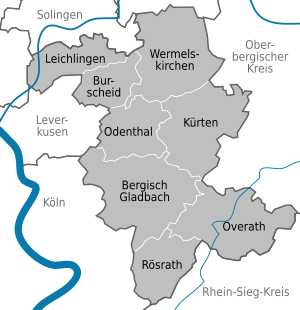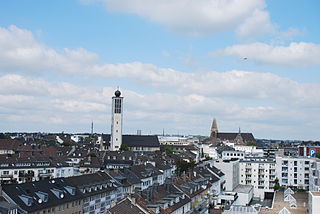
Solingen is a city in North Rhine-Westphalia, Germany. It is located some 25 km east of Düsseldorf along the northern edge of the region called Bergisches Land, south of the Ruhr area, and, with a 2009 population of 161,366, is after Wuppertal the second-largest city in the Bergisches Land. It is a member of the regional authority of the Rhineland.

The Bergisches Land is a low mountain range in the state of North Rhine-Westphalia, Germany, east of the Rhine and south of the Ruhr. The landscape is shaped by forests, meadows, rivers and creeks and contains over twenty artificial lakes. Wuppertal is the biggest town, while the southern part has economic and socio-cultural ties to Cologne. Wuppertal and the neighbouring cities of Remscheid and Solingen form the Bergisches Städtedreieck.
The Oberbergischer Kreis is a Kreis (district) in the state of North Rhine-Westphalia, Germany. Neighboring districts are Ennepe-Ruhr, Märkischer Kreis, Olpe, Altenkirchen, Rhein-Sieg, Rheinisch-Bergischer Kreis, and the urban districts Remscheid and Wuppertal.
Mettmann is a Kreis (district) in the middle of North Rhine-Westphalia, Germany. Neighboring are the Ennepe-Ruhr, Rhein-Kreis Neuss, Rheinisch-Bergischer Kreis and the district-free cities Cologne, Leverkusen, Wuppertal, Solingen, Düsseldorf, Duisburg, Mülheim, Essen. It is the most densely populated rural district in Germany; it borders Düsseldorf Airport in the northwestern district borders, on the city limits of Ratingen, and is also near Cologne Bonn Airport. It was named after Mettmann, its district seat.

Radevormwald is a municipality in the Oberbergischer Kreis, in North Rhine-Westphalia, Germany. It is one of the oldest towns in the Bergischen Land, formerly the County and Duchy of Berg.
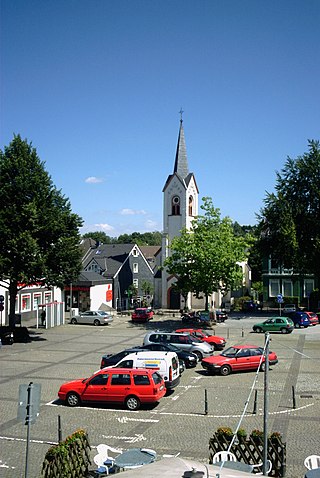
Wipperfürth is a municipality in the Oberbergischer Kreis of North Rhine-Westphalia, Germany, about 40 km north-east of Cologne, and the oldest town in the Bergischen Land.
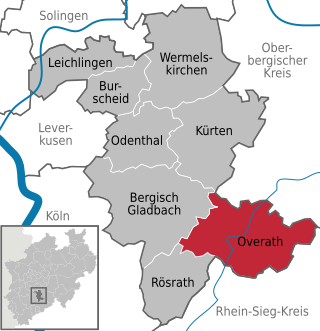
Overath is a town in the Rheinisch-Bergischer district of North Rhine-Westphalia, Germany.

Wermelskirchen is a town in the Rheinisch-Bergischer Kreis, in North Rhine-Westphalia, Germany, southeast of Remscheid. It is home to one of Europe's biggest live Christmas trees.

Rösrath is a town in the Rheinisch-Bergischer Kreis (district) in North Rhine-Westphalia, Germany. The earliest known documents mentioning the settlement Rösrath can be found in documents dated to 1356. There have been findings of Paleolithic and Mesolithic tools in the town area Forsbach. The community was elevated to the town status in 2001.
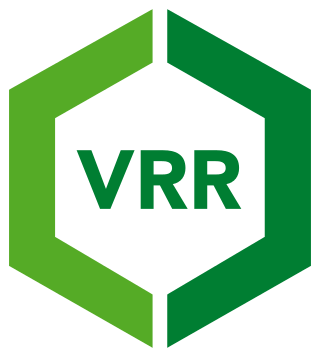
The Verkehrsverbund Rhein-Ruhr, abbreviated VRR, is a public transport association (Verkehrsverbund) in the German state of North Rhine-Westphalia. It covers most of the Ruhr area, as well as neighbouring parts of the Lower Rhine region, including Düsseldorf and thus large parts of the Rhine-Ruhr conurbation. It was founded on 1 January 1980, and is Europe’s largest body of such kind, covering an area of some 5,000 km2 (1,900 sq mi) with more than 7.8 million inhabitants, spanning as far as Dorsten in the north, Dortmund in the east, Langenfeld in the south, and Mönchengladbach and the Dutch border in the west.

Opladen, now a district of Leverkusen, used to be the capital of the Rhein-Wupper-Kreis (Rhine-Wupper-District) until 1975. Opladen station is located 15 kilometres (9.3 mi) northeast from Cologne on the railway to Wuppertal. It is also on the Autobahn A3. Population (1905) was 6338, (1975) 42,000.

Kürten is a village and a municipality in the Rheinisch-Bergischer Kreis, in North Rhine-Westphalia, Germany.

Lohmar is a town in the Rhein-Sieg district, in North Rhine-Westphalia, Germany.
The Gruiten–Cologne-Deutz railway is a major German railway. It is part of a major axis for long distance and regional rail services between Wuppertal and Cologne, and is served by Intercity Express, InterCity, Regional-Express and regionalbahn trains.
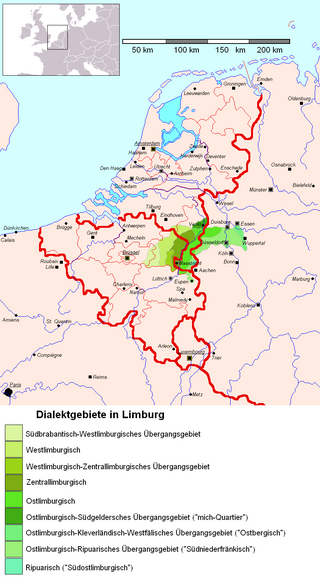
Bergish is a collective name for a group of West Germanic dialects spoken in the Bergisches Land region east of the Rhine in western Germany.

The Wuppertal-Oberbarmen–Solingen railway is a line in the Bergisches Land in the German state of North Rhine-Westphalia, which connects the three Bergisch cities of Wuppertal, Remscheid and Solingen. It is classified as a main line and is double track and non-electrified.
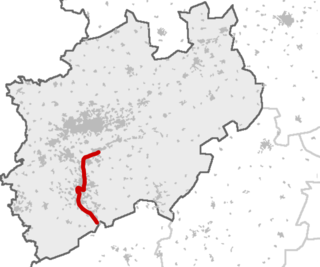
The Rhein-Wupper-Bahn is a Regionalbahn service in the German state of North Rhine-Westphalia. It connects the cities of Wuppertal, Solingen, Leverkusen, Cologne and Bonn and it is operated by National Express.

Remscheid-Lennep station is in the city of Remscheid in the German state of North Rhine-Westphalia. It is the second most important station in the city after Remscheid Hauptbahnhof. The station is located west of the old centre of Lennep and is classified by Deutsche Bahn as a category 5 station.

The Wuppertal-Oberbarmen–Opladen railway was a line built by the Bergisch-Märkische Railway Company in the Bergisches Land of the German state of North Rhine-Westphalia, running from Wuppertal via Remscheid-Lennep, Bergisch Born and Wermelskirchen to Opladen.

Witzhelden is a small town located in the district of Leichlingen near the cities of Düsseldorf, Solingen, and Cologne in the state of North Rhine-Westphalia in Germany.




